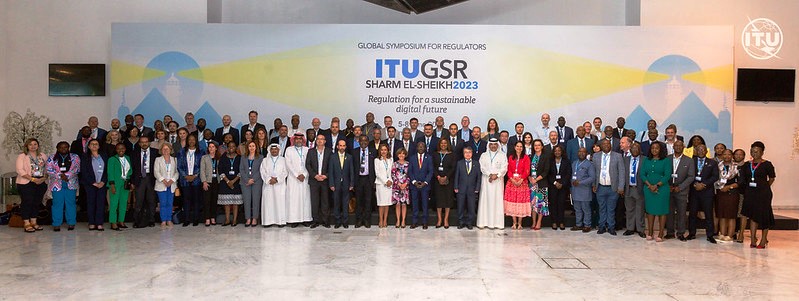New guidelines focus on introducing emerging digital technologies and deploying digital infrastructure everywhere, particularly in rural, unserved and underserved areas.
Regulatory leaders from around the world agreed today on a new set of guidelines to secure an inclusive and sustainable digital future for all.
The Best Practice Guidelines adopted at the International Telecommunication Union’s Global Symposium for Regulators (GSR-23) in Sharm el-Sheikh, Egypt, define regulatory and economic incentives to stimulate the deployment of digital infrastructure for all people everywhere.
RELATED: ITU targets USD 100 billion by 2026 to accelerate global digitalization
GSR-23 was hosted by the National Telecommunication Regulatory Authority (NTRA) of Egypt, under the auspices of H.E. President Abdel Fattah El-Sisi, President of The Arab Republic of Egypt.
“Tech is moving fast and won’t wait for us to catch up,” said ITU Secretary-General Doreen Bogdan-Martin. “The engagement and agreement on regulatory guidelines seen in the Global Symposium for Regulators platform show the way forward, ensuring technology can benefit all people and our planet.”
In order to advance universal and meaningful connectivity, the guidelines focus on regulatory approaches for rural, unserved and underserved areas as well as emerging technologies.
“The ICT sector has come to the forefront of the sectors that drive the sustainable development movement,” said H.E. Dr Amr Talaat, Minister of Communications and Information Technology (MCIT), Egypt. “The importance of the Global Symposium for Regulators, which Egypt was honored to host this year, comes as a platform for the exchange of expertise and experiences between decision-makers, telecommunications regulators, academic specialists, and industry pioneers in developing and developed countries alike.”
Since 2003, the GSR Best Practice Guidelines have captured established regulatory principles for a competitive, safe and inclusive enabling environment.
The 2023 Guidelines address and identify incentives that can be used to expand connectivity, and support access, adoption, and use. They also identify novel, innovative, ground-breaking, evidence-based cross-sector digital policy and regulatory principles to support a sustainable digital future for all people everywhere.
Based on contributions from national and regional policy-makers and regulators, regional and international organizations, civil society and the private sector, the guidelines identify collaborative approaches to encourage the development of investor-friendly markets that promote competition while stimulating innovation.
“The true potential of emerging technologies lies in their ability to uplift and empower underserved communities, creating a more inclusive and equitable future,” said Eng. Hossam El-Gamal, Chair of GSR-23 and Executive President of Egypt’s National Telecommunications Regulatory Authority (NTRA). “This new set of guidelines will facilitate the transition from disconnected to connected to productive users to ensure meaningful contributions to socio-economic development.”
At the three-day event, participants discussed the topics facing regulators today while also planning for the future.
“Dialogue among policy-makers, regulators and industry is critical,” said Cosmas Zavazava, Director of ITU’s Telecommunication Development Bureau. “We each have a role to play in ensuring universal and meaningful connectivity, which, as we already know, has the potential to accelerate the achievement of the Sustainable Development Goals by 2030. The Best Practice Guidelines build on our collective knowledge and shared commitment to provide the tools we need to drive universal connectivity and sustainable digital transformation.”
Ahead of GSR-23, the Industry Advisory Group on Development Issues and Chief Regulatory Officers (IAGDI-CRO) engaged industry and private sector members to discuss and share perspectives on how they can contribute to achieving effective digital transformation. These discussions were reflected in an Outcome Statement presented at the GSR-23 closing ceremony by Bocar Ba, IAGDI-CRO Chairman and CEO of Samena Telecommunications Council. The meeting reaffirmed the private sector’s commitment to supporting governments, particularly regulators, during today’s volatile and ever-changing environment, to achieve common goals both in the near and long term.
Also on 5 June, the Digital Regulation Network initiative was launched at the Regional Regulatory Associations Meeting, a unique platform for Regulatory Associations to share experiences and knowledge and to discuss collaboration. The initiative will help accelerate sustainable digital transformation by strengthening cooperation at the global and regional level to identify common approaches to collaborative digital policy, regulation and governance across economic sectors and across borders. The work will focus on three main building blocks: thought leadership, capacity development, and regulatory experimentation and innovation.
New Collaborative Digital Regulation Country Reviews for Brazil, Colombia, Egypt and Kenya were published during GSR-23. The reports, part of a series launched at the Global Symposium for Regulators in 2021, provide an authoritative analysis of the national regulatory landscape and outline a clear and practical direction for achieving G5 regulation and digital transformation.
The Director of ITU’s Telecommunication Development Bureau signed the following partnerships including:
- A Joint Declaration between the European Mediterranean Regulators Group and the Eastern Partnership Electronic Communications Regulators Network and the International Telecommunication Union regarding Strengthened Collaboration in the Field of Mapping of Broadband Infrastructure and Services.
- A Memorandum of Understanding between the International Telecommunication Union and the European Mediterranean Regulators Group (EMERG) to establish a High-Level Framework of Cooperation in the Area of Electronic Communications.
- A Project on Developing and Implementing E-waste Policy and Regulation for a Circular Economy.
On 7 June, a roundtable of the Network of Women (NoW) in the ITU Development Sector (ITU-D) provided female delegates with the opportunity to exchange views on how to develop gender-mainstreamed policies.
The event also included an exhibit where ITU showcased its role in facilitating digital transformation.































